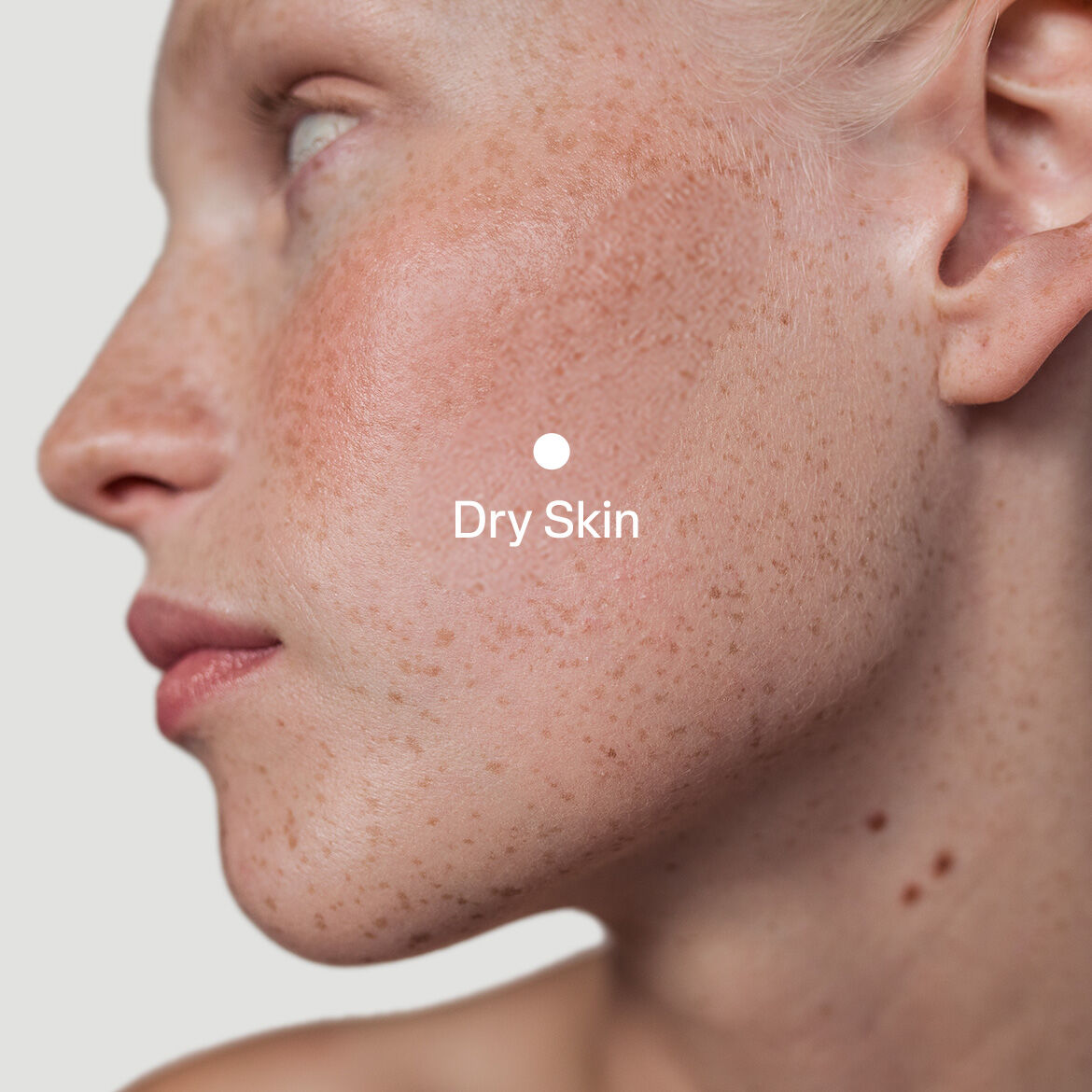The Hidden Causes of Dry Skin in Monsoon – How To Fix Them
The monsoon season brings the much-needed relief from the scorching heat. The sound of rain against the glass, the greenery everywhere, and the smell of grass after rain just wipes the stress away. But, for many, the monsoon also brings frustrating dry skin. While most people associate the monsoon with humidity and moisture, the truth is that dry skin in the monsoon is a common yet misunderstood issue.
If your skin feels flaky, tight, and itchy during monsoon, you are not alone. In this blog, we will understand the hidden causes of dry skin during monsoon and provide dermatologist-recommended solutions to fix them.

Understanding Dry Skin in Monsoon – More Than Just a Seasonal Issue
Dry skin is not just a winter concern; many people experience dryness, flaking, and sensitive skin during monsoons too. This is especially true for people with sensitive skin, where the natural skin barrier becomes vulnerable due to fluctuating humidity, microbial growth, and improper product use. Our skin doesn't always absorb atmospheric moisture, and excess sebum or sweat doesn't always mean hydration. Hence, addressing these common concerns and understanding monsoon skin care tips for dry skin becomes essential to maintain healthy, hydrated skin.
What's Causing Dry Skin During Monsoon?
Monsoon season appears to be skin-friendly on the surface, but several hidden triggers contribute to dry skin.
Humid Weather Doesn't Equal Hydrated Skin
Many people believe that high humidity and sweat keep the skin hydrated naturally. The reality is quite the opposite. Excessive moisture in the skin confuses the skin's natural hydration regulation. Skin may slow down its natural moisturising factor (NMF) production. Sweat and dampness can irritate sensitive skin, which leads to itching and dryness.
Harsh Cleansers and Overwashing
In an effort to feel 'clean and dry' during monsoon's sticky weather, people tend to overwash their faces or use aggressive cleansers. Washing it all the time removes all the natural oils, thus leaving the skin dry and flaky. Cleansers containing a lot of alcohol or sulphate, on the other hand, nd may break the skin barrier. Apply products recommended by dermatologists, such as Cetaphil Gentle Skin Cleanse, which can clean your skin without making it dry.
Skipping Moisturizer or Using the Wrong One
Many people skip moisturiser in monsoon, thinking their skin is already oily due to humidity and moisture, but oily skin is far different from a hydrated one. To keep your skin hydrated, make sure to use lightweight, non-comedogenic moisturisers. Look for humectants like glycerin, hyaluronic acid, or panthenol while using products for dry skin.
Dehydration Due to Poor Water Intake
It leads to a natural decline in people drinking water, especially when it is rainy. However, the effect on skin hydration is applied to the cellular level due to reduced water usage. Dry skin turns out to be flaky, veiled, and sensitive. Therefore, it is important to ensure that your care regimen for your dry skin is accompanied by sufficient daily water consumption.
How to Tackle Monsoon Dryness with the Right Skincare
During the monsoons, your dry skin management does not begin and end with the consumption of water or lotion. It is about applying the specified, medically supported ingredients, which are then able to replenish the hydration and safeguard the skin's barrier.
Ingredients That Work Best for Dry Skin in Monsoon
In monsoon, focus on hydrating, soothing, barrier-repairing ingredients in your skincare products:
- Hyaluronic Acid: Deep hydration without greasiness.
- Niacinamide: Reduces sensitivity and improves skin barrier.
- Glycerin: Draws moisture from the air to the skin.
- Panthenol: Soothes irritated and dry skin.
- Ceramides: Strengthen the lipid barrier.
- Shea Butter: Provides rich moisture for severely dry patches.
These ingredients are found in dermatologist-recommended Cetaphil products such as:
- Cetaphil Moisturising Cream
- Cetaphil Daily Hydrating Lotion
- Cetaphil Bright Healthy Radiance Perfecting Serum
Skin Care Routine for Dry Skin – Morning to Night
Build a skincare routine for dry skin that adapts to monsoon challenges.
Morning Routine:
- Gentle Cleanser: Use Cetaphil Gentle Skin Cleanser
- Hydrating Serum: Choose products with hyaluronic acid or niacinamide
- Light Moisturizer: Choose a non-comedogenic formulation
- SPF Protection: Even during monsoon, UV rays can harm your skin
Night Routine:
- Mild Cleanser: Avoid over-cleansing and stick to pH-balanced cleansers
- Repair Serum: Use calming ingredients like panthenol or vitamin E
- Barrier Moisturizer: Lock in moisture with ceramide-based cream
- Eye Cream: Don't ignore the delicate under-eye areas prone to dryness
Choosing the Right Products for Dry Skin During the Rainy Season
Selecting the right products for dry skin during monsoon is essential to prevent dryness. Here are some tips to choose the right product for your skin during monsoon.
- Always choose fragrance-free and hypoallergenic formulations.
- Prefer dermatologist-tested and non-comedogenic products
- Avoid hard exfoliants or alcohol based toners
- Always perform a patch test if you have sensitive skin
Recommended Cetaphil Products
We want the best for your skin because we know you deserve the best. Here is a list of dermatologist-recommended skincare products:
- Cetaphil Gentle Cleanser
- Cetaphil Moisturising Lotion
- Cetaphil Bright Radiant Cream
- Cetaphil Daily Exfoliating Cleanser
All these products are backed by clinical expertise and are ideal for sensitive and dry skin conditions.
Daily Monsoon Skin Care Tips for Dry Skin
Here is a checklist of daily monsoon skin care tips for dry skin.
- Use lukewarm water while cleansing
- Pat your skin dry instead of rubbing with a towel
- Apply moisturiser immediately after showering
- Carry a hydrating mist or lotion everywhere you go
- Drink 8-10 glasses of water daily
- Use a humidifier indoors if your home is air-conditioned
- Avoid synthetic clothing that traps sweat and irritates the skin
- Maintain a balanced diet with essential fatty acids
- Use broad-spectrum SPF even on a cloudy day
Recommended Products for Dry Skin (Cleansers, Moisturisers, Serums)
Explore these dermatologist-approved products for dry skin:
Cleansers
- Cetaphil Gentle Skin Cleanser- Soap-free and pH-balanced
- Cetaphil Bright Healthy Radiance Cleanser- Suitable for dull, sensitive skin
Moisturizers
- Cetaphil Mositurizing Cream- Rich hydration for very dry skin
- Cetaphil Daily Hydrating Lotion with Hyaluronic Acid- lightweight and fast absorbing
Serums
- Cetaphil Bright Healthy Radiance Serum- Fights dullness and improves moisture retention
- Cetaphil Brightening Night Comfort Cream- Repairs overnight while enhancing glow
All Cetaphil products are non-irritating, tailored for sensitive skin types, especially effective during climate change.
FAQs
Why does my skin feel dry even when the air is humid?
Humidity doesn't guarantee skin hydration. In high-moisture environments, your skin may reduce its natural moisturising factor (NMF) production, causing internal dryness. Sweat and excess sebum can also trap bacteria and irritants, compromising the skin barrier. Additionally, over-cleansing in humid weather strips away natural oils, leaving your skin feeling tight or flaky. If you have sensitive or dry skin, you're more prone to moisture imbalance. Use dermatologist-recommended products like Cetaphil Moisturising Cream to restore hydration and barrier health.
What are some quick fixes for dry hands in rainy seasons?
Dry hands are common in monsoon due to frequent washing, sanitisers, and exposure to damp environments. Quick fixes include:
- Applying a rich, non-greasy hand cream after every wash
- Using mild, fragrance-free cleansers
- Wearing cotton gloves overnight with moisturizer
- Avoiding alcohol-based sanitisers when possible
Products like Cetaphil Moisturising Lotion are ideal for restoring moisture without greasiness. Always pat your hands dry—never rub—and reapply moisturizer frequently to maintain barrier integrity.
Can air conditioning worsen skin dryness during the monsoon?
Yes, prolonged exposure to air conditioning can dry out your skin, even during humid monsoon weather. AC systems reduce ambient moisture, pulling water from your skin's surface and disrupting its barrier. This leads to increased dryness, sensitivity, and itching. If you spend long hours in air-conditioned rooms, use a hydrating moisturizer like Cetaphil Daily Hydrating Lotion with Hyaluronic Acid and consider using a humidifier indoors. Reapplying moisturizer every few hours helps counteract AC-related skin dehydration.
How often should I moisturize my skin in high humidity?
Even in humid weather, moisturizing twice daily is essential, once after a morning cleanse and again before bedtime. If your skin feels tight or flaky during the day, a third application can help. Choose a lightweight, non-comedogenic moisturizer with humectants like glycerin or hyaluronic acid, especially formulated for dry or sensitive skin. Avoid skipping moisturiser, thinking your skin is oily; surface oil doesn't indicate hydration. Cetaphil Daily Hydrating Lotion is a dermatologist-approved choice for monsoon skin hydration.
Are there specific skincare ingredients to avoid during monsoon for dry skin prevention?
Yes, some ingredients can worsen dryness in humid conditions. Avoid:
- Alcohol-based toners or astringents strip natural oils
- Sulfate-based cleansers – harsh on the skin barrier
- Artificial fragrances or dyes may irritate sensitive skin
- Strong acids or peels cause over-exfoliation and sensitivity
Stick to mild, fragrance-free, dermatologist-recommended formulas like Cetaphil Gentle Skin Cleanser and barrier-repair moisturizers. Always read labels carefully and opt for products designed specifically for dry or sensitive skin.


.png?sw=450&sh=450&sm=fit&q=85)
